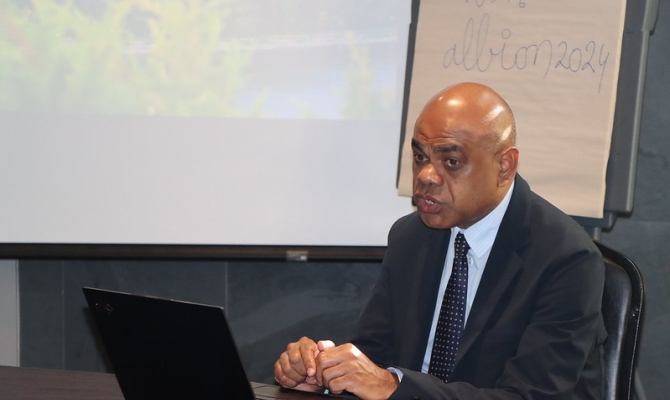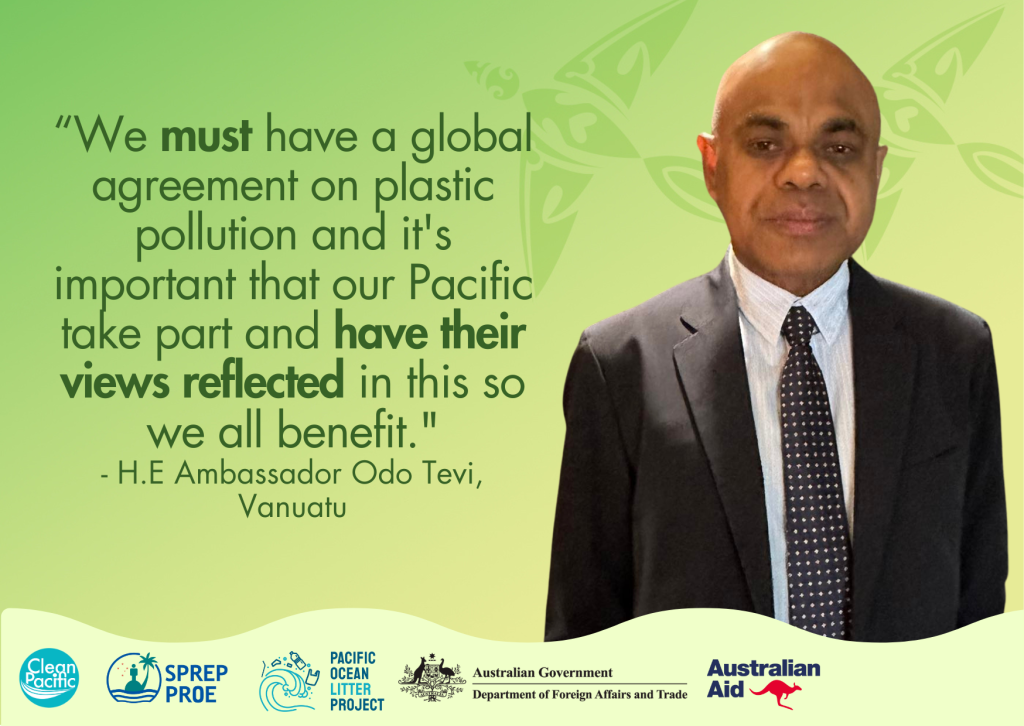
21 April 2024, Ottawa, Canada - The fourth session of the Intergovernmental Negotiating Committee to develop an international legally binding instrument on plastic pollution, including in the marine environment (INC-4), is taking place from 23 to 29 April 2024 in Ottawa, Canada.
This week, the Pacific Small Islands Developing States are preparing for the event through a series of meetings, both as PSIDS as well as the Alliance of Small Island States.
Plastic pollution is one of the triple planetary crises declared with climate change and biodiversity loss. Since the 1950’s there has been 9.2 billion tonnes of plastic produced of which 7 billion tonnes has become waste now filling up landfills and polluting our ocean. Unless we act now there will be more plastic than fish in our ocean by the year 2050.
Ahead of the Pacific Islands is the fourth of five negotiations sessions directed to complete a draft instrument by the end of 2024. We spent time with H.E Ambassador Odo Tevi, Permanent Representative of the Republic of Vanuatu to the United Nations, and the Chair of the Pacific Small Islands Developing States.
Q. On the cusp of entering the INC4 negotiations, what do you feel are our biggest challenges ahead as Pacific Small Islands Developing States?
A: “We are going to enter an arena, or a theatre where all the countries in the world will be represented, some will be the producers of plastics, of fossil fuels, and some will be powerful with influence. This can be a challenge as some may be the producers that export products that use plastic, so we can expect a challenge when we are pushing for high ambition as they may not want the same given this will affect their industries, profits and their employment. We must find a compromise somewhere to bring about an agreement, but the compromise must be one that does not sideline us. It must benefit us, that is very important.
The other challenge is if small islands states, especially the Alliance of Small Islands States (AOSIS) a very large grouping of countries is not able to unite in their positions for these negotiations. This could jeopardise our position overall. We must also0 ensure that whatever agreed AOSIS position is in place, that it doesn’t jeopardise our Pacific Small Islands Developing Sates (PSIDS) position. As PSIDS we must be vocal in AOSIS meetings to ensure our positions are reflected.”

Q. How do you feel we need to strategise for the negotiations ahead?
A. “We’ll continue, as PSIDS, to strategise being better coordinated and having stronger communication. We must be serious because if we aren’t, we won’t be at the table, we’ll be on the menu instead. We must have our best negotiators here as we do have political will and we do have our regional organisations helping to support our Pacific members to be empowered at the negotiating table.”
Q. What advice do you have for our Pacific Islands?
A. “I’d like to advise them to not be dismayed if our voices aren’t heard at first. I think what’s important is we must be united and we must continue to be persistent with our messages at the international negotiation. If we aren’t persistent then we won’t be heard. We also have to be visible in the halls where the negotiations are taking place, or bilaterally talking with major powers especially the super powers and all other countries that have strong economic interests as that could be your important bilateral partner. Its important to talk to them all in a friendlier environment to help with arriving at an agreement or treaty that will benefit us all.”
The fourth Intergovernmental Negotiating Committee to develop an international legally binding instrument on plastic pollution, including in the marine environment is taking place in Ottawa, Canada, from 23-29 April 2024. The Pacific Islands are represented by the Cook Islands, Federated States of Micronesia, Fiji, Kiribati, Marshall Islands, Nauru, Niue, Palau, Papua New Guinea, Samoa, Solomon Islands, Tonga, Tuvalu and Vanuatu through the support of the Government of Australia and the United Nations. They are supported by the Secretariat of the Pacific Regional Environment Programme (SPREP), working with partners the Pacific Islands Forum Secretariat (PIFS), Office of the Pacific Ocean Commissioner (OPOC), The Pacific Community (SPC), Forum Fisheries Agency (FFA), Environmental Investigation Agency (EIA), Centre for International Environmental Law (CIEL), University of Wollongong, WWF and Massey University.
For more information visit: https://www.unep.org/inc-plastic-pollution/session-4